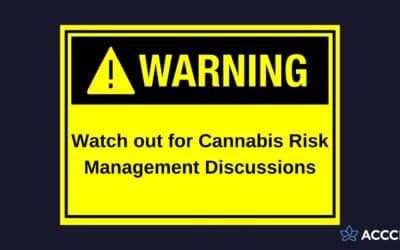
In the United States of America, commercial cannabis businesses must be aware of the Internal Revenue Service (IRS) requirements for Form 8300 when receiving over $10,000 in cash for a single or related transaction.
If you intentionally disregard the requirement to file a correct Form 8300 by the date it is due, the penalty is the greater of $25,000, or the amount of cash you received and were required to report (up to $100,000). There are criminal penalties for willful failure to file Form 8300; willfully filing a false or fraudulent Form 8300; stopping or trying to stop Form 8300 from being filed; and setting up, helping to set up, or trying to set up a transaction in a way that would make it seem unnecessary to file Form 8300. Criminal penalties include fines up to $500,000, or imprisonment up to five years, or both.
To reduce your civil and criminal risk exposure, start your risk-based approach to Form 8300 compliance today with a risk assessment, system of control, and looking at the past.
Risk Assessment
A risk-based approach mitigates civil and criminal risk by showing that the business reasonably looked for the risks that may affect it. Formalizing this documentation provides demonstrable proof that the business devotes appropriate attention and resources to high-risk issues, even if it fails to prevent non-compliance. Many commercial cannabis businesses operate at some capacity in cash and the IRS has published its guidance specifically on the Marijuana Industry | Internal Revenue Service (irs.gov) page to inform participants that they may have Form 8300 compliance obligations. At minimum, your risk assessment should assess the inherent risk that your business:
- Does or could accept over $10,000 in cash for a single or related transaction
- In the past, has accepted over $10,000 in cash for a single or related transaction
If the business does not and has not accepted cash over $10,000, consider formalizing in policy or procedure the business’s stance and check for non-compliance on a periodic schedule.
If the business does or has accepted over $10,000 in cash, the business should determine if its quality of controls will appropriately manage the risk of non-compliance for Form 8300 and, if applicable, look at remediating any past issues.
Implement a System of Control
Form 8300 requires the business to be able to appropriately file form 8300, provide a notice to the payee, and retain records; however, the penalties for non-compliance with form 8300 include criminal penalties that many commercial cannabis businesses, their owners, employees, and investors want managed. To further manage the risks of form 8300 the business should consider all components of the Cannabis Risk Management Framework, which include, but are not limited to:
- Assign a qualified individual to fill out and file Form 8300
- Enhance the risk assessment to include Form 8300
- Implement procedures and processes for managing Form 8300
- Assign risk-based training to employees with Form 8300 responsibilities
- Implement risk-based reporting to management to identify relationships where the cash payment was deemed suspicious
- Implement risk-based monitoring to assure that reportable cash payments are identified, Form 8300 is accurately and timely filed, and notices are provided
To see the entire risk issue, members should log in to their ACCCE account and go to Form 8300 | Commercial Cannabis Handbook (accce.org).
Remediate
For a risk-based approach to effectively mitigate your risk, a business should undertake “an adequate and honest root cause analysis to understand both what contributed to the misconduct and the degree of remediation needed to prevent similar events in the future.”(U.S. Department of Justice Criminal Division Evaluation of Corporate Compliance Programs). If your business has identified non-compliance with Form 8300 consider addressing the following:
- Investigate the non-compliance by a qualified individual to determine root causes, system vulnerabilities, and accountability lapses
- Respond to the investigation by identifying actions taken to prevent and detect similar non-compliance in the future
- Where possible, remediate identified Form 8300 non-compliance
The IRS is available for questions online or through IRS office or volunteer sites near you. There are also many professional service providers that specialize in enhancing risk-based approaches to mitigate the cost of non-compliance.



